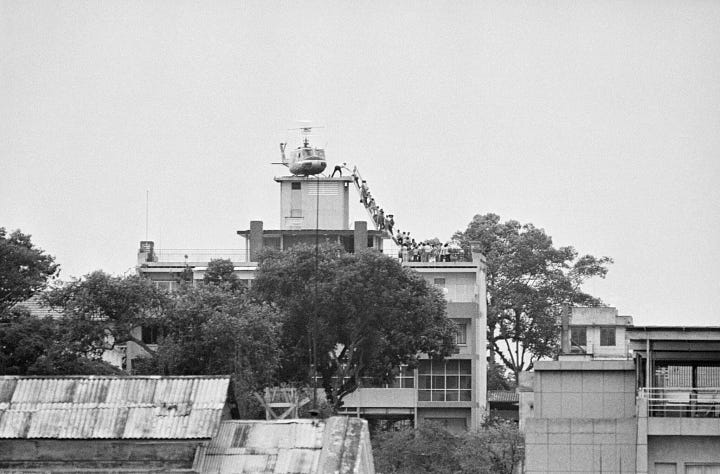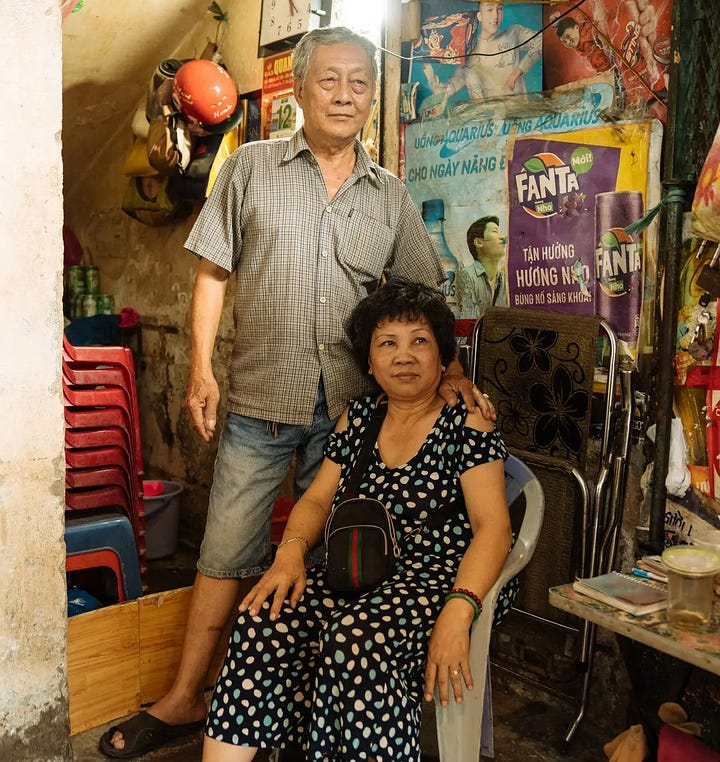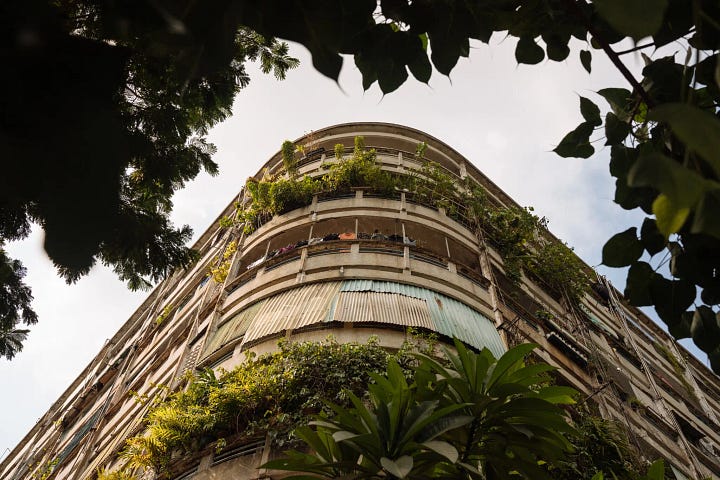midweek gems #26
The Vietnam War's impact, 50 years later + heirloom wontons and chicken rice recipes
This week’s gems arrives a day early to commemorate the end of the Vietnam War on April 30, 1975. It’s the 50th anniversary today and for most people, it’s just another day. For Vietnamese people, it’s either somber or victorious, depending on which side of the conflict you were on. For anyone who served during the war, it is a moment for reflection.
You are here for the food and culture, but I would not be here if it weren’t for the Vietnam War. So let’s spend a bit of time to explore its meaning and impact. I promise to not let this be a downer.
I’ve been curious about how the 50th Anniversary of the Fall of Saigon would play out in the public consciousness, in America and in Vietnam. For many, 50 years ago is ancient history. There was no internet back then. What’s a rotary phone?
Leading up to today, I’ve been collecting articles for you to consider. Also, I’ve got a couple 1970s family recipes that I still crave today — not just for nostalgic reasons! They are damn good and I still make them.
💎 The Vietnam War through the eyes of journalists
Most Americans alive during that era recall the war in vivid imagery, televised footage, and nonstop reporting. Articles for you to explore (these are all gift links that will expire 4 weeks from now):
How Photography from the Vietnam War Changed America (NYT) offers chilling, haunting images to walk us through the horrors of the war. The photo essay conveys how the Vietnam War was a pivot in the American consciousness. The pain and disillusionment seeded much of the division and distrust we witness today. “We are all living, in some ways, in Vietnam’s shadow,” journalist Damien Cave writes.
When South Vietnam Died 50 Years Ago (WSJ) was originally published on May 2, 1975. Its author, Peter Kann, was a WSJ staff reporter in Vietnam during the war. His perspective echoes that of foreigners who made deep connections with the people of Vietnam. There were many wrongs in South Vietnam but many wonderful things too, especially when you got to know its people. This part of Kann’s essay struck me:
💎 The Vietnam War from the perspective of Vietnamese people
Kann’s piece mentions that in 1975, there were 40 million people in the combined population of North and South Vietnam. Today, Vietnam is a nation of over 100 million people. It is in the news not because of the war but because of trade and tariffs. “Made in Vietnam” or “Assembled in Vietnam” appears on articles of clothing, shoes, and even Apple computers.
What do Vietnamese people in Vietnam and abroad think of the 50th anniversary? What is the Hanoi government doing to commemorate?
The Americans Fled Vietnam 50 Years Ago. I Visited the Buildings They Left Behind (NYT) is also by Damien Cave. Cave goes to the “Pittman” building made famous by the helicopter evacuation in 1975 from Saigon; the offices of the United States Information Service, which oversaw propaganda campaigns; and the building once occupied by the U.S. Navy’s logistics team.
What did people remember from the War, if anything? Who did the government let live, work or operate businesses in these historically significant buildings? You don’t just move it. You have to be approved by the bureaucracy.




In the Los Angeles Times, 50 Years after the Fall of Saigon, Vietnam tweaks its story, Stephanie Yang reports from Vietnam. Yang traces the Hanoi government’s changed attitude towards America and the War. For the 50th anniversary, there are parades and speeches, albeit they are toned down, not malicious and vindictive as they once were. The lead photo (below) tells the story well. Communist governments choose their words carefully and April 30 is now a reunification celebration. For regular folks it’s a grand photo opportunity!
America is home to over 2.3 million people of Vietnamese descent. How people perceive the Vietnam War depends on their age, family experience with the war, and where they settled. The Washington Post ran a nice story with interviews of Vietnamese Americans. I know two of the people interviewed, author Viet Thanh Nguyen and chef Ann Luu.
Take a read of Scars, secrets and memories: 50 years after the end of the Vietnam War for the texture of humanity that makes up the Viet community in the United States. For instance, the nail salon ladies have stories to tell! 😉 You just have to ask them.

💎 Vietnamese American heirloom recipes
My family was very grateful to be in America, to say the least. Within weeks after we arrived, we were resettling in San Clemente in a spacious apartment. (We were a family of seven.)
My dad eventually hustled his way into a job teaching English as a Second Language. My mom launched an in-home tailoring business. My dad and siblings walked around town, dipping into small local businesses to say “Hello” and distribute my mom’s business card.
My mother cooked dinner for us daily (who could afford to go out?), marshaling us kids into duties. From her kitchen emerged dishes like Maggi Roast Chicken. There were also these favorites:


💎 Chicken and celery rice (cơm gà) is a humble-yet-special rice that we prepared with 25 cent per pound chicken backs. We picked meat off the chicken carcasses because we were so happy to have such a wealth of food. Think of all the chickens that were sacrificed, we’d say, as we dove into the rice. It was budget friendly and tasty. I adore the rice to this day. It perfumes the kitchen with comforting aromas and involves just a few staples. You don’t have to brew stock from scratch. 😁 There are shortcut tips in the recipe.
💎 Fried wontons were my first dumpling projects. I filled and folded them for my parent’s big “Thank You” party for our new American neighbors and friends. I’ve been making the wontons ever since. Our family recipe, combined with homemade sweet and sour sauce, were divine. It’s super simple. We sourced ingredients from the local Albertson’s supermarket. That’s all we had in the early days and we were darn well fed. Hop to the wonton and sweet and sour sauce recipes.
If you want unfried wontons, make gingery wontons in chili oil. I’m sort of a wonton fiend!
Ghetto food, humble food, cucina povera. It was our family’s food and it was splendid. Those foods made us feel safe. My parents were very stressed in those first few months of being in America. I cannot imagine starting over in your 40s with five children to shelter and feed. But they did it fearlessly.
I salute my parents and all the people who have braved coming to America to start anew. We’re all immigrants in one way or another.
Coming on Sunday, let’s consider what you would need to start over.







This is a wonderful article about the American War, your family’s emigration and beautiful Vietnam, that I have recently travelled in. Thank you for sharing your precious family memories and the recipes.
There are so many of us, Vietnamese, Americans, Australians among others whose lives were irrevocably changed by the Vietnam War/American War (depending on your side) and for us April will always be a month of remembrance and reflection. Depending on our perspectives, we may remember differently, but we will always, always remember where we were, what we did, what we lost, and what new doors opened as others closed.